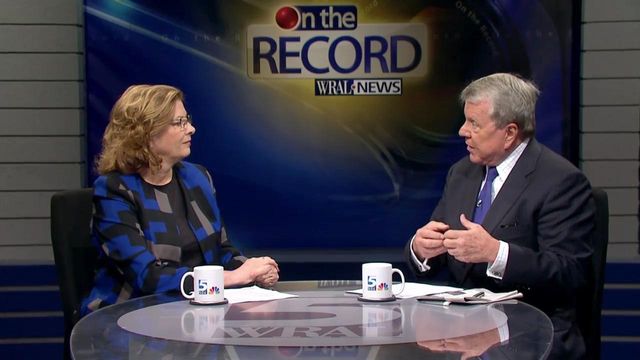How to handle growth at core of Raleigh mayoral race
The challenges created by Raleigh's booming population, from traffic congestion to crowded schools to escalating housing costs, have become a major theme of Raleigh's mayoral race.
Posted — UpdatedFour days before voters held to the polls next Tuesday, two-term Mayor Nancy McFarlane and challenger Charles Francis sat down with WRAL News anchor David Crabtree on Friday to discuss the race in an episode of "On the Record."
"We're a good city but not a great city. I think we need leadership in the Mayor's Office in order to become a great city," said Francis, an attorney who grew up in Raleigh.
McFarlane and the City Council rely too much on city staff and consultants instead of taking the lead on issues, Francis said, citing as an example police officers and firefighters waiting two years for a compensation study to be completed before they were given raises.
"The mayor and the City Council need to wrap their brains around policy and lead rather than follow the staff and consultants," he said.
McFarlane said she and the council are heavily involved in policy decisions and the long-range planning needed to ensure growth doesn't destroy Raleigh.
"The challenge is to not let the growth overwhelm us," she said. "All these people that are coming, they have to live somewhere, most of them are going to work somewhere, you have to build schools for them. So, how do we accommodate that many people and not just destroy what we have? It's that balance of saving the character of neighborhoods and saving the character of the city, but also accommodating that growth."
Francis said accommodating growth has come at the expense of long-time residents in recent years.
"Growth should not just be for populations or for buildings that go up on the skyline. It ought to be for the quality of life for people who are already here. We shouldn't just think about the people who are coming," he said.
Raleigh needs to invest more in transit to help residents get around without clogging the streets, and more equity is needed in how and where the city spends its money. For example, although he sees Dix Park as a long-term asset for the city, there are several parks in low-income areas where the gymnasiums lack air conditioning.
"What I want to do is to include everyone in the growth and prosperity of our city so that all people in Raleigh can have an opportunity to succeed," he said.
McFarlane helped negotiate the purchase of the 300-acre Dix Park site from the state two years ago and remains one of its biggest champions. She sees it as an economic driver for years to come, drawing tourists and surrounding development.
"I have a proven record of creating an incredible place," she said. "I really want [Raleigh] to be somewhere where every person – child, adult, whatever – can reach their full potential. Whatever that dream is, this is the place to find it, and I think I'm the one with the experience to make that happen."
• Credits
Copyright 2024 by Capitol Broadcasting Company. All rights reserved. This material may not be published, broadcast, rewritten or redistributed.





